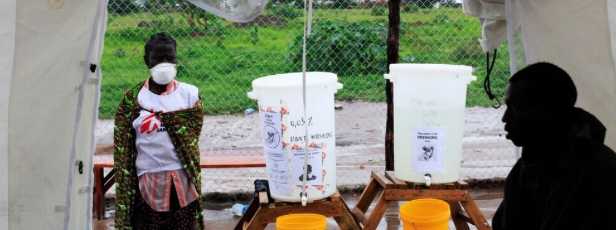OCHA, the UN humanitarian coordination office, released a situation report on Friday covering the period 24-30 May. The information below represents a selection of highlights from the report:
Suspected cases of cholera in Juba more than doubled, increasing from 395 cases on 22 May to 892 on 28 May, including 27 deaths.
The estimated number of people sheltering in UN bases spiked to over 95,000 after a verification process in Bentiu, Unity State.
Security arrangements and site preparations are nearly complete at the new ‘POC3’ site near UN House camp in Juba. The site is expected to accommodate over 13,000 people after relocations from the UN Tomping displaced camp.
In order to decongest the PoC site in Bentiu, Unity State, preparations on a new site have been continuing and construction of latrines and land demarcation began. The new site will shelter approximately 10,000 people.
The UN Mine Action Service (UNMAS) deployed a team to Bentiu on 22 May to conduct verification and clearance of unexploded ordinance. De-miners also cleared an anti-tank mine along the Yirol-Abang road in Lakes State.
Humanitarian access is diminishing countrywide as more areas become impassible due to rains. The logistics pipeline for supplies for the entire greater Bahr el Ghazal region has been slowed. Rains have delayed the delivery of supplies by road to Rumbek and Wau and further rendered the major road from Kuajok to Tonj East County impassable.
Planned distributions of assistance to Nasir and Ulang counties in Upper Nile State were put on hold due to insecurity.
Preliminary findings of the survey conducted in Panyijar, Unity State showed a general acute malnutrition rate of 31.6 per cent and severe acute malnutrition rate of 9.7 per cent.
Another survey conducted in Aweil South in Northern Bahr el Ghazal, showed a general acute malnutrition rate of 26.1 per cent and severe acute malnutrition rate 5.9 per cent.
An inter-agency assessment missions to Leer town and Rubkuai (in Mayendit County, close to Leer town) found a prevalence of diarrhoea, respiratory infections and malaria, compounded by malnutrition especially among children under the age of five. One health organization reported 1,600 children as severely malnourished in its treatment center in this area within a two week period.
Food shortages persisted in Maban, Upper Nile, forcing thousands of Sudanese refugees to return to Sudan’s war-torn Blue Nile State.
Photo: Cholera treatment center in Juba (MSF)
FORUM: Join the discussion on Facebook about the inclusion of civil society groups and other ‘stakeholders’ at the next round of talks in Addis Ababa.



